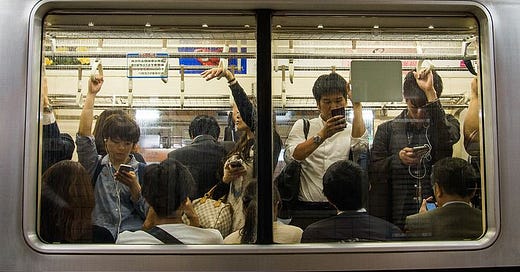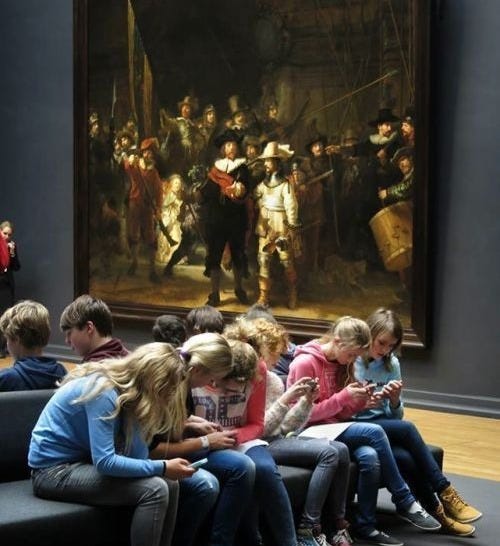living to scroll, forgetting to feel
how humans now live for social media rather than themselves
I always found it ironic when people would post their ‘morning routines’ to YouTube or TikTok. The videos always begin the same way: sunlight bleeding softly through gauzy curtains, birdsong suspended in the air like some divine orchestration. A girl awakens – not groggy, not reluctant – but weightless, already glowing. She floats into her pristine kitchen and makes her ‘easy, everyday yet healthy and fulfilling’ breakfast full of all the nutrients she needs. Fresh fruit with Greek yogurt and freshly squeezed orange juice because no one in this superficial world drinks coffee – don’t you know how bad that is for you? ‘You should never drink caffeine as soon as you wake up!’ the internet warns – though moments later, your feed suggests a dozen cafes you must try.
You watch all this unfold, phone in hand, still wrapped in the folds of your unmade bed. As she lives the perfect example of a calm yet extremely productive morning, you recoil into yourself. You stayed in bed too long. You scrolled for an hour. You wasted the morning – unlike her. You get out of bed, furious at yourself, and glance at the reflection looking back at you: tangled hair, last night’s mascara faintly streaking your cheek, pyjama bottoms clinging awkwardly from restless sleep.
What a perfect morning.
What no one thinks about though is how artificial that morning is. That ‘morning’ we envied was a mere performance. No one wakes up with a camera ready to document their princess-like awakening. No one wakes up with silky smooth hair, and a natural dusting of makeup on their face. What appears to be the most calming morning is the most curated. Everyone knows not to trust Instagram posts of the girl who in real life is a size 16 but miraculously weasels down into a size 6 on her bikini photos. Everyone knows not to trust the most recent scandal surrounding the it girls of Hollywood for that month. So why do we let stupid things like a ‘romanticised’ life impact the worth of our own?
This is not some sort of self-righteous claim that I don’t let social media affect me, I’m not claiming to have it all figured out. I’m not one to talk – I literally have Pinterest boards dedicated to this idea of a ‘romanticised life’. Every day I think at least one of the following statements to myself as I mindlessly scroll:
‘Wow I wish I had her hair’.
‘Omg I love her outfit; I wish I had her wardrobe’.
‘Look at her body, I wonder if she worked for it or if she was genetically gifted’.
‘I would give anything to live like that’.
So, if I can extend so much grace, admiration, and longing towards strangers... why can’t I offer even a fraction of that to myself?
Because I’m constantly trying to live my life with some unspoken standard of ‘aestheticism’ and ‘romanticisation’. If I see a sunset, I can’t just appreciate it. I need to get the perfect photo of it, so it encapsulates its beauty, because if I don’t document it how am I ever meant to remember it? If I’m out with my friends, we need to take some nice photos because if we don’t look absolutely perfect then why would anyone on Instagram care about it. Aesthetic alignment. Feed cohesion. I no longer live in the moment. I live for the memory of the moment. For how it will appear when someone else stumbles upon it.
I live more for the life I’ve created online rather than the one I’m currently living.
I also know this isn’t just me; humans have become fashionable accessories to the mobile phone.
Step outside. To a park. A café. The subway. Count the people on their phones. Or rather – count those who aren’t. It will be the loneliest number you’ve seen all day. The place it shocks me the most is the subway on my commute to university. Despite being underground zero signal everyone was still on their phones which are rendered useless without that life supply of connection. I looked to the people next to me, they weren’t even doing anything important on their phones, just scrolling on their homepage, loading up apps then closing them down when they remembered the lack of signal, doing absolutely nothing just so they had something to do. A desperate pantomime of purpose. People don’t remember what life is like without their phones – they don’t know what to do with themselves.
And yet – there are still the occasional cracks in the digital epidemic where human life shines through. I saw a TikTok (yes, the irony of that is not lost on me) and it was a man with a guitar, singing Don’t Look Back in Anger on the subway. Everyone started off on their phones, casting silent glances occasionally his way, but then one voice joined, then another. Soon, the entire car erupted into song. Clapping. Laughing. Living. Even as phones emerged to record the moment, for a brief, golden second, humanity resembled itself.
I see this kind of accidental intimacy in women’s bathrooms, too – those strange sanctuaries where strangers become sisters. Compliments exchanged over lipstick shades. Laughter shared like secrets. A brief suspension of the script. Yet in any other social setting, people would much rather stay with their phone than engage with conversation with other people. If you can talk to girls you don’t know in a bathroom, why can you not do the same with a girl sitting at a table alone with her lunch? What is it in society that has deemed speaking to girls in bathrooms acceptable but not a girl sitting alone?
We are terrified of rejection now. Terrified of strangeness. Of seeming too eager, too awkward, too real. These fears didn’t begin from society – it’s an algorithmic fear that has warped its way into our realities. You posted a TikTok you loved; it got only 40 likes. Your worth now diminished because obviously what you loved wasn’t good enough. So, how could you possibly go up to that girl who looks like she wants nothing more than someone to talk to her? That’s not what we do anymore.
What we do is sit in silence. Scroll endlessly. Project curated versions of ourselves while starving the parts that crave connection. We are forgetting how to be human. We no longer speak unless spoken to. We no longer feel unless filtered through a lens. Our lives are measured in likes and views and aesthetic coherence. We are not living. We are documenting the idea of living.
I don’t know when we stopped living for ourselves. I only know I miss the world we lost.





thank you for this! i think it is so interesting (and devastating) how we have become used to living our lives for an audience - one that is never present in that moment, but the one that will see the posts, stories, tiktoks, whatever it is. this was such an important reminder 🩷